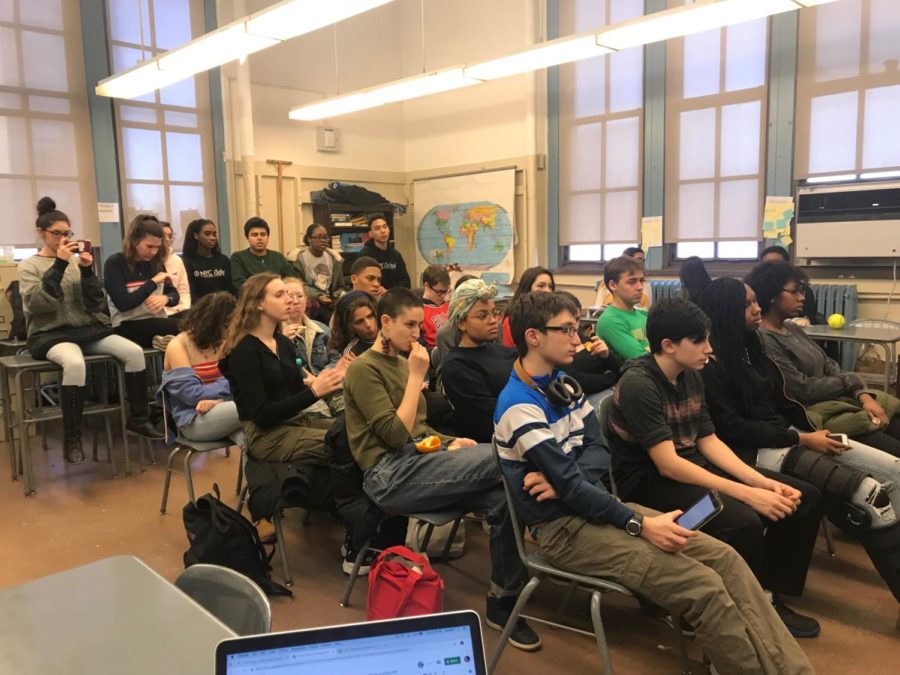iSchool’s Town Hall
March 21, 2019
iSchoolers gathered at the Student Government’s first Town Hall on Thursday, February 28, where Ms. Leimsider and Ms. Bailey discussed topics such as the mastery system, AP courses, the iSchool difference, problems with the bathrooms, and retakes.
Dozens of students from every grade level gathered there to discuss a number of topics. Many students asked eloquent questions, and students had a direct platform to hear Ms. Leimsider and Ms. Bailey’s opinions and feelings on a number of important issues. This is what they said.
On the fear of people spitting in the soap dispenser in the boy’s bathroom (Ms. Leimsider): The problem with (the soap dispenser) is you can’t take the lid off, but we’ll take a look at that. It’s been scooped out, dumped on the floor, put in the urinal, that thing has been through everything. (Ms. Bailey): The first question was ‘why was the soap dispenser being spat in’ and the thing is we can’t monitor what happens in the boy’s bathroom all the time, and we had to open the doors of the bathroom because there was a lot happening in the boy’s bathroom and some people felt unsafe in there.
On accommodating students with mental health issues (Ms. Leimsider): It depends on the kid, and the student. We do this all the time, in our twelve years here we’ve had a number of students leave due to hospitalization, and other things. We’ll talk to the family, the kids themselves, talk to their doctors, to see what they’re able to manage and put a plan together. So yeah, it all depends on the student.
On the mastery policy (Ms. Leimsider): I go back all the way to the beginning of the school and I use the philosophy and vision of the school when we created the school. When we were designing the school, at the time the graduation rate in NYC was 50 percent, which is sad. The truth is the 50 percent of students who were graduating were mainly white and in the middle to upper class. When the iSchool opened, we were opened to rethink high school, and to think about what learning actually is and how students should learn. The mastery piece of our plan came into place because the fact is that not everyone learns in the same way at the same time, so something that it takes one person two days to figure out might take another person three weeks to figure out. And it’s not fair that the person who takes three weeks to figure something out should be penalized for it. If they understand the material that’s what’s most important to us, that you all understand the material, not that you understand it immediately. So the idea was is that students should have an opportunity to be able to show mastery of a subject and be able to show mastery at any time. So maybe you didn’t understand the concept when you took the test the first time, but if you get it three weeks later you should get credit for understanding it. So that was the philosophy and belief we had when we created it. And how it manifests itself in every single classroom sort of changed over the years. And we know it’s different from teacher to teacher.
On teachers letting you retake tests (Ms. Leimsider): I know that some teachers this year have taken away the “retake” idea. And the belief about that, and I’m happy to explain this to you if the teachers didn’t explain why they did this. From my understanding, their philosophy was “is it really mastery if you take a test and do poorly, and then you can go back and retake the answers and be like “now I know it’s 45” and put it in, as opposed to four weeks later being tested on those same concepts and seeing how much you understand it, and then after that your grade is changed. And then the idea has gone around of “is showing mastery once actually showing mastery” or do you have to show mastery multiple times to really prove your understanding of it. But with that, it’s kind of tricky to do that in a quarter-long course as opposed to a yearlong course, and it’s a planning nightmare for teachers to do this. Whatever the variation of our policy, as long as that core philosophy of you as a student being able to show mastery of the material at any point and get full credit for it, as long as that’s intact in the policy, I feel like I don’t know if there’s one perfect way for a teacher to express the mastery policy. For me, that core notion is the most important thing for me.
Ms. Bailey: I agree with Ms. Leimsider but one thing I would add is I heard people shouting out “75-25” (as in 75 percent mastery and 25 percent productivity for your grade) but if I had it my way it would be 100 percent mastery. It’s about what you know and both two grades are important, but the productivity should be helping you show mastery.
On the additions of more AP classes or Online AP classes (Ms. Leimsider): The short answer is no. The longer answer is it’s about learning. The school was designed to be something different. We don’t believe in you having to study for an intense exam, there shouldn’t be more AP exams. If the purpose of there being more AP classes was for the love of learning, that’s why we have the ones we have now, and logistically we can’t offer more. We’re kind of at the maximum amount right now. If we had more year-long courses that takes away from the other, cooler classes we could offer. Once you get to your junior or senior year, your schedule gets really tough, and adding more yearlong courses would just make it tougher. The AP courses we offer, we offer them because we think that they could help later on.
Finally, on the best way to combat rape culture and overall insensitivity towards the issue of sexual assault in the iSchool community (Ms. Leimsider): You are right, it exists everywhere, and we are an extension of our world. When I think about rape culture and a lot of things that happen in our world, it’s about how do we create a culture at our school where we can feel comfortable enough to communicate to each other, and where we can say “hey that’s not right” and how do we create a culture where we can support each other in that way.



